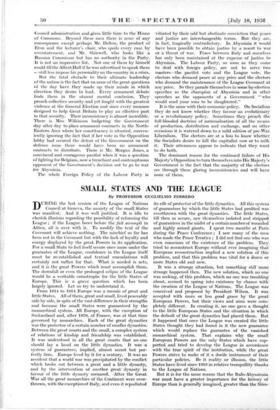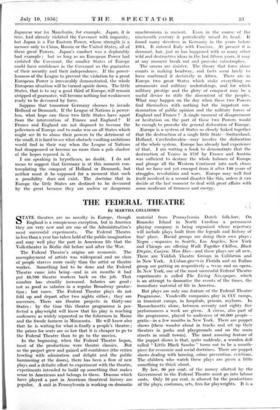SMALL STATES AND THE LEAGUE
By PROFESSOR GUGLIELMO FERRERO DURING the last session of the League of Nations Council at Geneva, the anxiety of the small, States was manifest. And it was well justified. It is idle to cherish illusions regarding the possibility of reforming the League ; if the League bows before the 'fait accompli in Africa, all is over with it. To modify the text of the Covenant will achieve nothing. The mischief so far has been not in the Covenant but with the lack of loyalty and energy displayed by the great Powers in its application. For a small State to feel itself secure Once more under the guarantee of the League, confidence in the League itself must be re-established and textual emendations will certainly not suffice for that. What is needed is acts, and it is the great Powers which must accomplish them. The downfall or even the prolonged eclipse of the League would be a veritable catastrophe for the little States of Europe. This is a grave question which has been largely ignored. Let us try to understand it.
From 1814 to 1914 Europe was a mosaic of great and little States. All of them, great and small, lived peaceably side by side, in spite of the vast difference in their strengths and because the small States were guaranteed by the monarchical system. All Europe, with the exception of Switzerland and, after 1870, of France, was at that time governed by monarchies. Each of the great dynasties was the protector of a certain number of smaller dynasties. Between the great courts and the small, a complex system of relations of kinship and friendship was established. It was understood in all the great courts that no one should lay a hand on the little dynasties. It was a system of guarantees, implied, almost secret but per- fectly. firm. Europe lived by it for a century. ' It was no accident that a world war was precipitated by the conflict which broke out between a great and a little dynasty; and by the intervention of another great dynasty in favour of the little dynasty menared. •After the Great War all the great monarchies of the Continent were over- thrown, with the exception of Italy, and even it repudiated its role of protector of the little dynasties. All this system of guarantees by which the little States had profited was overthrown with the great dynasties. The little States, till then so secure, saw themselves isolated and stripped of guarantees in the midst of a certain number of wounded' and highly tinned giants. I spent two months at Paris during the Peace Conference ; I saw many of the men who made the Peace Treaties ; I did not find one who was even conscious of the existence of the problem. They tried to reconstruct Europe without ever imagining that European reconstruction implied a new solution of this problem, and that this problem was vital fora doien dr more States old and new. • It was a strange situation, but something still More strange happened then. The new solution, which no one was seeking, of this problem, which no one was troubling: about, seemed to spring into existence by chance with' the creation of the League of Nations. The League was conceived and proposed by President Wilson. ' It *its accepted with more or less good grace by '"the .great European Powers, but their views and aims were coin pletely different. In creating it, no one gave a thought to the little European States and the situation in which the default of the great dynasties had placed them. But it happened that once the League was created the little States thought they had found in it the new guarantee which would replace the guarantee of the vanished monarchical system. That explains why the small European Powers are the only States which have sup- ported and tried to develop the League in accordance witV the true spirit of the' in§titution, while the great PoWers strive to make of it a docile instrument Of their particular policies. Be it reality or illusion, the little States have lived since 1918 in relative tranquillity thanks to the League of Nations.
But it is for the same reason that the Italo-Abyssinnia war must have a greater importance for the history of Europe than is generally imagined, greater than the Sing= Japanese war for Manchuria,. for example, , Japan, it is true, had already violated the Covenant with impunity, but Japan is a Far Eastern .Power, whose strength is .a menace only to China, Russia or the United States, all of them great Powers. Japan's conduct was a deplorably bad example ; but so long, as no European Power had violated the Covenant, the smaller States of Europe could have confidence in the Covenant as the guarantee of their security and their independence. If the power lessness of.the League to prevent the violation by a great European Power is irrevocably demonstrated, the whole European situation will be turned upside down. The little States, that is to say a good third of Europe, will remain stripped of guarantee, will become nothing but weaknesses ready to be devoured by force.
Suppose that tomorrow Germany chooses to invade Holland or Denmark. If the League of Nations is power- less, what hope can these two little States have apart from the. intervention of . France and England ? If Prance and England are . not disposed to become the policemen of Europe and to make war on all States which might see fit to abuse their powers to the detriment of the small, it is hard to see what obstacle vaulting ambitions would find in their way when the League of Nations had disappeared or become no more than a pale shadow of the hopes reposed in it.
I am speaking in hypotheses, no doubt.. I do not mean to suggest that Germany is at this moment con- templating the conquest of _Holland or Denmark, but neither must it be supposed for a moment that such a possibility does not exist. The doctrine that in Europe the little States are destined to be devoured by the great because they are useless or dangerous anachronisms is ancient. Even in the course of the nineteenth century it periodically raised its head. It found • many devotees in Germany in the years before 1614. It entered Italy with Fascism. At present it is dormant, but, just as has happened with so many other wild, and destructive ideas in the last fifteen years, it may at any moment break out and provoke catastrophes.
The omens are sinister. The theory that force alone counts is making headway, and facts seem lately to have confirmed it decisively in Africa. There are in Europe two great States which stake everything on armaments and military undertakings, and for which military prestige and the glory of conquest may be a useful device to stifle the discontent of the peoples. What may happen on the day when these two Powers find themselves with nothing but the impotent con- demnation of public opinion and the military forces of England and France ? A single moment of disagreement or hesitation on the part of these two Powers would be enough to provoke the general dislocation of Europe-.
Europe is a system of States so closely linked together that the destruction of a single little State—Switzerland, Holland, Czechoslovakia—may involve the dislocation of the whole system. Europe has already had experience of that. I am writing a book to demonstrate that the destruction of Venice in 1797 by France and Austria was sufficient to destroy the whole balance of Europe and plunge all the Western Continent into such chaos that we have not yet emerged from it after 140 years of struggles, revolutions and wars. Europe may well find itself involved in a second disaster like this, unless it can decide at the last moment to deal with great affairs with some modicum of firmness and energy.











































 Previous page
Previous page